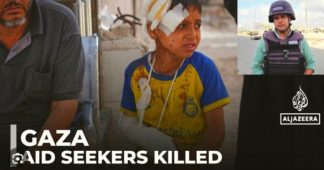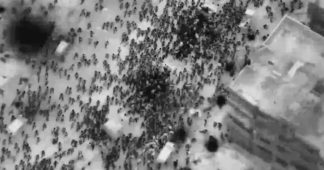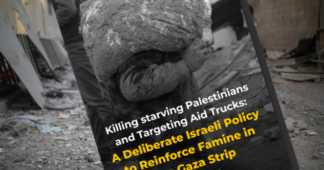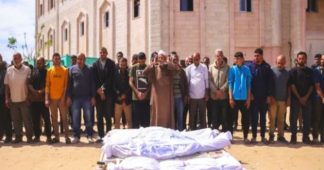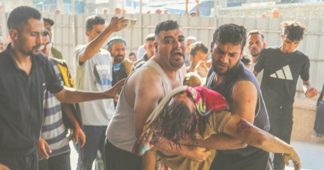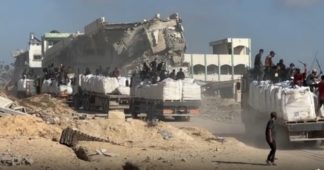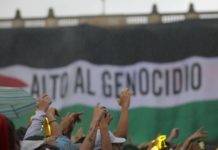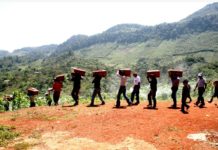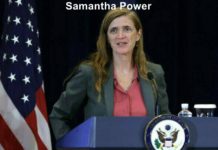David Edwards*
Jul 9, 2025
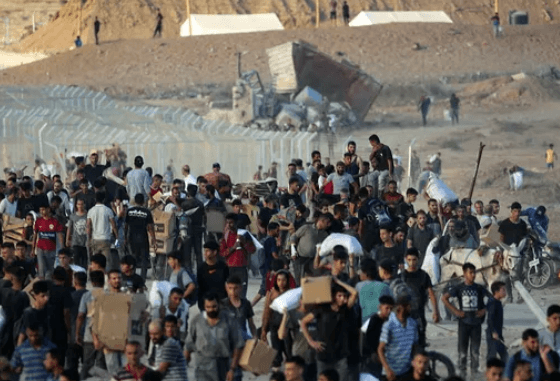
On 27 June, the Israeli newspaper Haaretz published an article that demolished many of the conceits held by ‘mainstream’ journalists about Israel’s assault on Gaza. The BBC’s response to the report was a breathtakingly clear example of its willingness to suppress publicly available information in order to protect a key ally of the British government, even when that ally is committing genocide.
In its report, ‘“It’s a Killing Field”: IDF Soldiers Ordered to Shoot Deliberately at Unarmed Gazans Waiting for Humanitarian Aid’, Haaretz noted that Israel’s Gaza Humanitarian Foundation (GHF) aid centres began operating four food distribution sites in Gaza at the end of May. The GHF sites are run by American and Palestinian workers, and ‘secured’ by the Israeli army.
Thousands, and sometimes tens of thousands, of Gazans arriving daily to collect food from these aid centres know that they are open for only one hour each morning, but they do not know when each centre will open. This is a problem because, according to officers and soldiers who served in GHF areas, the Israeli army fires at civilians who arrive before opening hours to prevent them from approaching and, after the centres close, to disperse them. The Gaza Health Ministry has reported that 549 people have been killed and more than 4,000 wounded near aid centres and in areas where residents were waiting for UN food trucks since May 27. Haaretz reported eyewitness testimony:
‘“It’s a killing field,” one soldier said. “Where I was stationed, between one and five people were killed every day. They’re treated like a hostile force – no crowd-control measures, no tear gas – just live fire with everything imaginable: heavy machine guns, grenade launchers, mortars. Then, once the center opens, the shooting stops, and they know they can approach. Our form of communication is gunfire.”
‘The soldier added, “We open fire early in the morning if someone tries to get in line from a few hundred meters away, and sometimes we just charge at them from close range. But there’s no danger to the forces.” According to him, “I’m not aware of a single instance of return fire. There’s no enemy, no weapons.”’ (Our emphasis)
Haaretz quoted a reservist who had been on duty in the northern Strip that week:
‘It’s become a place with its own set of rules. The loss of human life means nothing. It’s not even an “unfortunate incident,” like they used to say.’
A reserve tank soldier who recently served with Division 252 commented:
‘“The teenagers waiting for the trucks hide behind dirt mounds and rush them as they pass or stop at distribution points,” he said. “We usually see them from hundreds of meters away; it’s not a situation where they pose a threat to us.”
‘In one incident, the soldier was instructed to fire a shell toward a crowd gathered near the coastline. “Technically, it’s supposed to be warning fire – either to push people back or stop them from advancing,” he said. “But lately, firing shells has just become standard practice. Every time we fire, there are casualties and deaths, and when someone asks why a shell is necessary, there’s never a good answer. Sometimes, merely asking the question annoys the commanders.”’ (Our emphasis)
A senior reserve officer commanding forces in the area told Haaretz:
‘“When we asked why they opened fire, we were told it was an order from above and that the civilians had posed a threat to the troops. I can say with certainty that the people were not close to the forces and did not endanger them. It was pointless – they were just killed, for nothing. This thing called killing innocent people – it’s been normalized. We were constantly told there are no noncombatants in Gaza, and apparently that message sank in among the troops.”’ (Our emphasis)
The report described a shocking moral indifference to the massacre of starving civilians:
‘“They talk about using artillery on a junction full of civilians as if it’s normal,” said a military source… “An entire conversation about whether it’s right or wrong to use artillery, without even asking why that weapon was needed in the first place. What concerns everyone is whether it’ll hurt our legitimacy to keep operating in Gaza. The moral aspect is practically nonexistent. No one stops to ask why dozens of civilians looking for food are being killed every day.”’
Another senior officer familiar with the fighting in Gaza commented:
‘“The fact that live fire is directed at a civilian population – whether with artillery, tanks, snipers, or drones – goes against everything the army is supposed to stand for,” he said, criticizing the decisions made on the ground. “Why are people collecting food being killed just because they stepped out of line, or because some commander doesn’t like that they’re cutting in? Why have we reached a point where a teenager is willing to risk his life just to pull a sack of rice off a truck? And that’s who we’re firing artillery at?”’
The Haaretz report helped to explain the astonishing footage of urban areas in Gaza reduced to rubble as though erased by nuclear weapons:
‘“Today, any private contractor working in Gaza with engineering equipment receives 5,000 [roughly $1,500] shekels for every house they demolish,” said a veteran fighter. “They’re making a fortune. From their perspective, any moment where they don’t demolish houses is a loss of money, and the forces have to secure their work. The contractors, who act like a kind of sheriff, demolish wherever they want along the entire front.”’
‘Cat Got Your Partisan Tongue?’
The Haaretz article leaves the reader in no doubt about why hundreds of civilians have been killed and thousands injured at food aid centres since the end of May. The impact of the piece was such that the report went viral on social media and was discussed even by influential ‘mainstream’ journalists who clearly found it too shocking to ignore.
Referring to these confessions and to the furore sounding the punk band Bob Vylan wishing death on the Israeli army at the Glastonbury music festival, the BBC’s Jeremy Vine asked:
‘How can you be outraged at Vylan and not outraged about people being shot up in food queues?’
On the day the report was published, Piers Morgan challenged fiercely pro-Israel commentator Jake Wallis Simons, former editor of The Jewish Chronicle, on X:
‘Hi Jake, I haven’t seen any comment from you about the shocking @Haaretz report on IDF soldiers confirming they were ordered to kill unarmed Palestinians queuing for food. Cat got your partisan tongue?’
On the same day, Morgan posted a seven-minute video on the same theme:
‘Piers Morgan reads out a list of incidents since the end of May involving people in Gaza being shot while queueing for food to former IDF spokesman Doron Spielman’
On 29 June, two days after the Haaretz piece appeared, the BBC’s Alex Boyd reported on ‘the creation of a US and Israeli-backed aid group, the Gaza Humanitarian Foundation (GHF)’. Boyd commented:
‘GHF’s aid system has been condemned by UN agencies. There have been repeated incidents of killings and injuries of Palestinians seeking aid.’
The report continued:
‘Juliette Touma, communications director for the UN agency for Palestinian refugees, Unrwa, told the BBC that the new mechanism was “a killing field”. She said the distribution of aid in an orderly way could only be done through the UN and other humanitarian organisations.’
The reference to ‘killing fields’ of course reminds us of the Khmer Rouge’s Cambodian genocide – but who is killing whom in Gaza? We weren’t told.
Boyd’s piece included GHF’s defence of its record:
‘GHF boss Johnnie Moore previously told the BBC World Service’s Newshour he did not deny deaths near aid sites, but said “100% of those casualties are being attributed to close proximity to GHF” and that was “not true”.’
Compare the BBC’s report that ‘There have been repeated incidents of killings and injuries of Palestinians seeking aid’ and that the ‘new mechanism’ was ‘a killing field’ – none of which alleges or reports that Israeli forces are deliberately targeting, killing and wounding large numbers of unarmed starving civilians posing no threat – with the Haaretz report that clearly states who is killing whom and why.
On 3 July, nearly one week after the Haaretz report had appeared, the BBC’s Lucy Williamson reported under this headline:
‘Gaza aid contractor tells BBC he saw colleagues fire on hungry Palestinians’
The report began:
‘A former security contractor for Gaza’s controversial new Israel- and US-backed aid distribution sites has told the BBC that he witnessed colleagues opening fire several times on hungry Palestinians who had posed no threat, including with machine guns.
‘On one occasion, he said, a guard had opened fire from a watchtower with a machine gun because a group of women, children and elderly people were moving too slowly away from the site.’
Notice that to ‘fire on’, and the fact that a guard ‘had opened fire from a watchtower’, does not mean any civilians were actually hit. The report continued:
‘Continuing his description of the incident at one of the GHF sites – in which he said guards fired on a group of Palestinians – the former contractor said: “As that happened, another contractor on location, standing on the berm overlooking the exit, opened up with 15 to 20 shots of repetitive weapons fire at the crowd.
‘“A Palestinian man dropped to the ground motionless. And then the other contractor who was standing there was like, ‘damn, I think you got one’. And then they laughed about it.”
‘The contractor, who spoke to us on condition of anonymity, said GHF managers had brushed off his report as a coincidence, suggesting that the Palestinian man could have “tripped” or been “tired and passed out”.’
The evidence, then, is that just one eyewitness, a contractor, claimed that one Palestinian man had dropped to the ground – and even then, we are left in doubt about whether the Palestinian man was actually hit by bullets.
When asked to respond, the Gaza Humanitarian Foundation (GHF) said the allegations were ‘categorically false’:
‘They referred us to a statement saying that no civilians ever came under fire at the GHF distribution sites.’
The report continued:
‘The man we spoke to, who said he had worked at all four of the GHF distribution sites, described a culture of impunity with few rules or controls.
‘He said contractors were given no clear rules of engagement or standard operating procedures, and were told by one team leader: “if you feel threatened, shoot – shoot to kill and ask questions later”.
‘The culture in the company, he said, felt like “we’re going into Gaza so it’s no rules. Do what you want.”
‘“If a Palestinian is walking away from the site and not demonstrating any hostile intent, and we’re shooting warning shots at them regardless, we are wrong, we are criminally negligent,” he told me.
‘He told us that each site had CCTV monitoring the activity in the area, and GHF insistence that no one there had been hurt or shot at was “an absolute bare-faced lie”.’
So, nearly a week after Haaretz’s devastating report, the BBC cited a single security contractor, who the GHF described as a ‘disgruntled former contractor’ whose employment had been terminated for misconduct by the GHF, which the man denies. The report concluded by noting:
‘Earlier this week more than 170 charities and other NGOs called for the GHF to be shut down. The organisations, including Oxfam and Save the Children, say Israeli forces and armed groups “routinely” open fire on Palestinians seeking aid.
‘Israel denies its soldiers deliberately shoot at aid recipients and says the GHF’s system provides direct assistance to people who need it, bypassing Hamas interference.’
The report did contain a graphic listing, ‘Major incidents near aid centres in Gaza’, with blame for killing often apportioned to Israeli fire by mostly Palestinian sources. This is indeed disturbing material, but the BBC’s evidence – and this, presumably, is not accidental – is not remotely comparable to Haaretz’s testimony of serving Israeli soldiers, including senior officers, who have blown the whistle on the deliberate killing of unarmed civilians posing no threat.
In a separate piece, the BBC’s Helen Sullivan did manage to mention the Haaretz article:
‘According to a report by Israeli newspaper Haaretz on Friday, unnamed Israel Defense Forces (IDF) soldiers said they were ordered to shoot at unarmed civilians near aid distribution sites to drive them away or disperse them.’
‘Ordered to shoot at’? In fact, Haaretz reported that Israeli soldiers were routinely killing and wounding large numbers of unarmed civilians offering no threat. In what journalistic universe is Sullivan’s description an accurate representation of the Haaretz report?
It was significant that the BBC immediately followed mention of the Haaretz report with this:
‘Israel’s Prime Minister Benjamin Netanyahu strongly rejected the report, calling the allegations “malicious falsehoods”.’
Another report by the BBC’s Ione Wells commented of the Israeli army:
‘However it denied any allegations of deliberate fire at civilians, such as those raised in a report by the Israeli newspaper Haaretz on Friday.
‘That report quoted unnamed IDF soldiers who said they were ordered to shoot at unarmed civilians near aid distribution sites, to drive them away or disperse them.’
Again, the same carefully chosen words that contain the tiniest, least damning fraction of truth from Haaretz’s utterly damning report.
Like Jeremy Vine and Piers Morgan, Lucy Williamson, Helen Sullivan and Ione Wells and their editors will have been keenly aware of the precise details of the Haaretz report. Selecting a few of the most shocking quotes from the most credible whistleblowers, as we have done here, would have been the natural course of action for independent, impartial journalists writing on exactly the same issue. So why didn’t Williamson, Sullivan and Wells and their editors do so?
Any fair observer would have to conclude that the BBC felt obliged to respond to the Haaretz confessions by discussing the subject but chose to do so in a way that did the least possible damage to the reputation of a key ally of the British government. And yet we are talking about the BBC reporting on an Israeli government that is committing the first livestreamed genocide.
Remarkably, in the aftermath of the Haaretz report, the BBC website has simply stopped reporting Israel’s food aid massacres. We found ourselves checking the respected Israeli human rights organisation B’Tselem to see if the killing really had stopped, as the BBC’s coverage seemed to suggest. B’Tselem reported 130 killed in Gaza on 3 July, 104 killed on 4 July, 86 killed on 5 July, 120 killed on 6 July and 89 killed on 7 July. None of this could be guessed from BBC headlines, even on its ‘Israel-Gaza War’ page.
Writing about the Haaretz report, the courageous and principled Israeli journalist Gideon Levy concluded:
‘Gaza is a parallel universe,” testified one officer to Haaretz. This is the crux of the matter, the matter of genocide. Gaza is not a parallel universe. Gaza is the face of the IDF and the State of Israel. What happens in Gaza will not remain in Gaza, even though most Israeli media outlets wish it so. What happens in Gaza defines Israel in the world, and what happens in Gaza will define Israeli society for many years to come.’
Gaza is not a parallel universe, and nor is media reporting on Gaza. It will also define US-UK ‘mainstream’ media, the BBC very much included, for many years to come.
*David Edwards is co-editor of medialens.org and author of ‘A Short Book About Ego… and the Remedy of Meditation’, published last month by Mantra Books, available here.
We remind our readers that publication of articles on our site does not mean that we agree with what is written. Our policy is to publish anything which we consider of interest, so as to assist our readers in forming their opinions. Sometimes we even publish articles with which we totally disagree, since we believe it is important for our readers to be informed on as wide a spectrum of views as possible.
